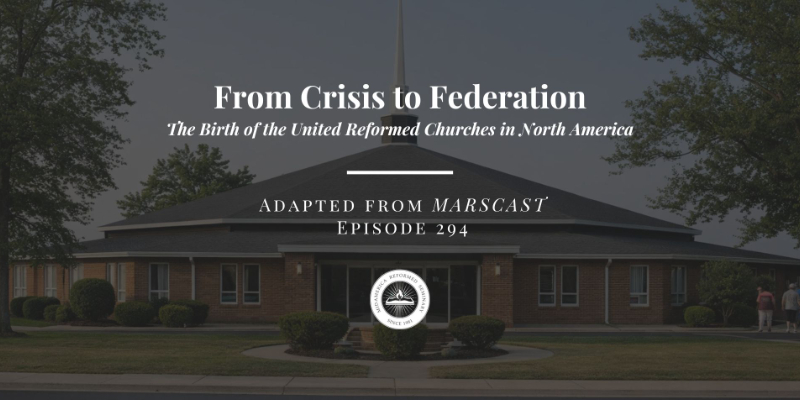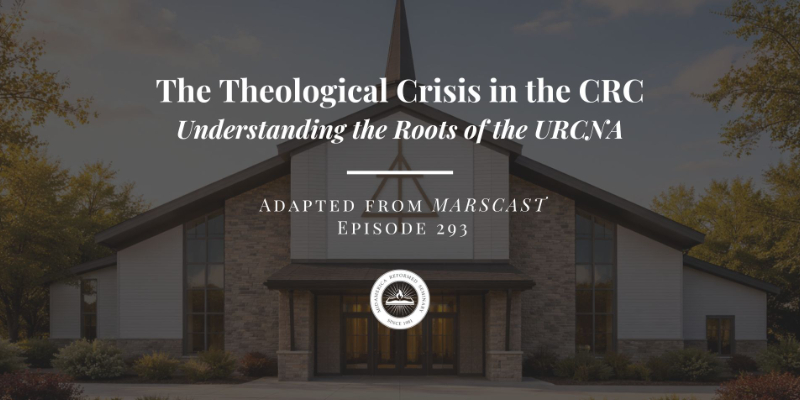
Reflections on Christian Nationalism
This article was adapted from MARS' faculty podcast, episode 190, featuring Dr. Alan Strange.
Introduction
In recent years, a phrase has emerged with startling frequency in evangelical and political circles alike: "Christian nationalism." Depending on who utters it, the term carries wildly divergent meanings. For some, it is a badge of honor and signals a noble desire to reclaim America for Christ. For others, an ominous blend of theological triumphalism and political overreach. In many respects, it has become a kind of Rorschach test for our cultural moment: one sees in it what one most loves or fears about the intersection of faith and politics.
Over the past year, many have immersed themselves in the literature that both promotes and critiques this ideology. Books have piled high. Articles, blog posts, and podcasts continue to pour in from every corner of the ecclesiastical and political spectrum. Many are acutely aware that young men, earnest in their love for the Lord and rightly dismayed at the cultural degeneration around us, are asking serious questions. They are looking for direction and clarity.
Christian nationalism, as a movement, is attempting to provide them with just that. But as will be argued throughout this reflection, it does so in ways that are historically naive, theologically dubious, and pastorally dangerous. The times do call for courage. But they also call for wisdom. And wisdom, according to Scripture, always begins with the fear of the Lord and not with the retrieval of political power.
The Cultural Crisis That Breeds Reactionary Movements
To understand the rise of Christian nationalism, one must first appreciate the broader cultural currents that have given it life. We live in an age marked by what might be called "vicious secularism." This is not the old-fashioned Enlightenment-style secularism, which may have disagreed with Christianity but still made room for it in the public square. Rather, ours is a militantly moralistic secularism, one that views Christian conviction as not merely outdated but actively harmful.
The legalization of same-sex marriage, the normalization of gender fluidity, the rise of critical race theory in our institutions, and the rapid abandonment of any shared moral vision in public discourse have all contributed to a widespread sense of disenfranchisement among conservative Christians. This is particularly acute among young men, many of whom feel they are constantly being told that their beliefs are regressive, their instincts are toxic, and their heritage is oppressive.
This sense of loss, cultural place, moral certainty, and masculine identity has left a vacuum. And as nature and politics both abhor a vacuum, something has come in to fill it. That something is Christian nationalism.
One of the intellectual figureheads of the current movement is Stephen Wolfe, whose 500-page tome The Case for Christian Nationalism offers a full-throated argument for what he sees as a much-needed reassertion of Christian political identity. Wolfe laments what he describes as Christianity’s "Stockholm Syndrome" theology, a posture of passive accommodation to secular dominance. He calls for a "re-institutionalization" of Christianity, whereby Christian laws, customs, and social structures would once again shape national life.
To many disillusioned evangelicals, this is compelling stuff. It feels strong and unapologetic, like the kind of Christianity that built cathedrals and shaped empires. But is it the Christianity of the New Testament? That is the question that must be asked.
The Historical Context: America and the Myth of a Christian Nation
One of the most persistent myths in American civil religion is the notion that America was founded as a distinctly Christian nation, a "city on a hill," divinely ordained to be a beacon of righteousness to the nations. This mythos has deep roots and wide influence. Richard Gamble, in his sobering book In Search of the City on a Hill, demonstrates how this vision of America as an "almost chosen nation" has evolved over time, taking on theological and even eschatological weight.
Of course, the truth is far more complicated. The Founding Fathers were a theological mixed bag. While some were orthodox Christians, many were deists, Unitarians, or otherwise heterodox in their theology. The Constitution itself is a remarkably secular document, and the early republic was far more concerned with freedom of religion than with the promotion of any one religion.
And yet, the cultural Protestantism of early America did create the conditions for a kind of informal Christian influence on public life. Church attendance was high. Biblical literacy was widespread. Moral norms, while far from perfect, often aligned with Christian teaching. But to confuse cultural Christianity with biblical Christianity is to make a category error of the highest order.
Even still, this longing for a "Christian America" lingers. It resurfaces in every call to "take back our country" and in every appeal to "restore our national greatness." What is often being invoked is not a biblical vision of justice and righteousness but a nostalgic longing for a mythologized past. And Christian nationalism, in its more aggressive forms, is essentially an attempt to baptize that nostalgia with theological legitimacy.
The Theological Concerns: Kingdom Confusion and Gospel Compromise
At the heart of Christian nationalism lies a fundamental confusion between the kingdom of Christ and the kingdoms of this world. Wolfe and others argue that Christians should not merely seek to influence the public square, but should actively pursue the creation of a "Christian nation" through political means. This includes the establishment of explicitly Christian laws, leaders, and cultural norms.
But here the Reformed tradition issues a firm caution. While it certainly affirms the Lordship of Christ over all creation and recognizes the legitimacy of Christian influence in civic life, it does not endorse the conflation of church and state. Our forefathers in the faith, especially those in the Calvinistic and Presbyterian streams, were painfully aware of the dangers of ecclesiocracy and coercive religion.
Christ Himself declared, "My kingdom is not of this world." He refused the devil's offer of the kingdoms of the earth. He taught His followers that greatness in His kingdom looks like service, not sovereignty. The Apostle Paul reminds us that our citizenship is in heaven. The Apostle Peter calls us "sojourners and exiles."
Christian nationalism, by contrast, often exhibits a disdain for this pilgrim theology. It sees it as weak, ineffective, even cowardly. It prefers strength, dominion, and visibility. But the path of the cross is never glamorous. It is the way of suffering, not supremacy. The kingdom of God advances not through legislation but through regeneration.
To be clear, this does not mean that Christians should be apolitical. Far from it. We are called to seek the welfare of the city, to vote wisely, to advocate for just laws. But we must do so as Christians, not as nationalists. Our allegiance is to Christ, not to a flag. Our mission is the gospel, not cultural reclamation.
The Movement's Intellectual Architecture: Books, Thinkers, and Influences
Stephen Wolfe is far from alone in his efforts. The intellectual and emotional energy behind Christian nationalism is vast and varied. Andrew Torba and Andrew Isker’s smaller volume offers a more populist and accessible argument for dominion theology, couched in biblical rhetoric and urgent tone. Doug Wilson’s Mere Christendom further expands on this vision, advocating for a return to a public Christianity that governs not just church life but civic order.
These works are being widely read, especially among younger Christians disillusioned by the culture wars and drawn to a bolder vision of Christian engagement. Wilson, Torba, Wolfe, and their circles are not hesitant to criticize the so-called "weakness" of mainstream evangelicalism, accusing it of cultural compromise and theological softness.
They are not entirely wrong in their diagnosis. Much of evangelicalism has failed to offer a compelling public theology. It has either retreated into pietistic isolation or capitulated to progressive moral agendas. But the cure offered by Christian nationalism may be worse than the disease.
The Critics: Voices of Caution and Clarity
Thankfully, a number of thoughtful critiques have emerged. Kevin DeYoung, in a particularly helpful review of Wolfe's book, outlines both the strengths and the significant flaws of the argument. He acknowledges the legitimate concerns about secularism but warns against adopting an ecclesio-political strategy that is alien to the New Testament.
Paul Miller, in The Religion of American Greatness, offers a robust theological and political critique of Christian nationalism and emphasizes the dangers of cultural idolatry and the loss of gospel distinctiveness. Neil Shenvi, Brian Mattson, and others have provided valuable analyses, often from within the Reformed camp, seeking to steer young Christians away from the errors of dominionism without pushing them toward political apathy.
Even critiques from more progressive quarters, while needing to be read discerningly, offer insights into how Christian nationalism is perceived by the watching world. Books like Taking America Back for God by Whitehead and Perry, and White Evangelical Racism by Anthea Butler, though coming from very different presuppositions, remind us of the optics and implications of our public witness.
A Better Vision: Faithful Presence in a Foreign Land
What, then, is the way forward? The church's mission remains what it has always been: to proclaim Christ and Him crucified, to make disciples of all nations, to live quiet and godly lives, and to adorn the gospel with lives of holiness, justice, and mercy. We must resist the temptation to seize what can only be given: true authority rooted in gospel witness, not political force.
We are exiles, yes, but we are also ambassadors. We do not rage against Babylon, nor do we become Babylon. We bless it, pray for it, and bear witness to a better kingdom, one that will not be shaken.
Recent articles




